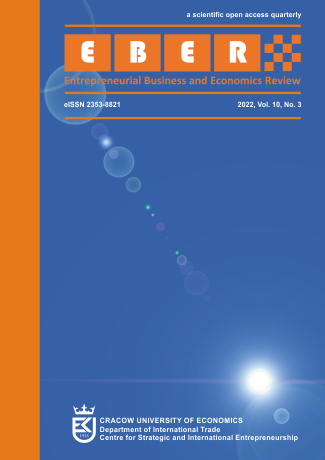Identifying factors affecting entrepreneurship education and entrepreneurial intention among Indonesian university students
Identifying factors affecting entrepreneurship education and entrepreneurial intention among Indonesian university students
Author(s): Sri Umi Mintarti Widjaja, Agus Wibowo, Bagus Shandy Narmaditya, Cipto Wardoyo, Ari SaptonoSubject(s): Higher Education , Sociology of Education
Published by: Uniwersytet Ekonomiczny w Krakowie
Keywords: e-learning; lecturer competence; self-efficacy; students’ entrepreneurial intention; entrepreneurship education;
Summary/Abstract: Objective: The shift from conventional to online learning activities may impact students’ performance and entrepreneurial involvement. This research investigates the role of e-learning in determining entrepreneur- ship education and entrepreneurial self-efficacy, and students’ intention on entrepreneurship.Research Design & Methods: A quantitative method with structural equation modelling using the partial least squared was implemented to understand the phenomenon. The study involved students who enrolled in online entrepreneurship education in several universities in Malang of Indonesia.Findings: The findings indicate that students’ entrepreneurship education and self-efficacy can be performed using e-learning, and it is closely linked with lecturer competence, performance expectancy, and facilitating condition. The results also show a linkage between entrepreneurship education and entrepreneurial intention. This research confirms a crucial role of self-efficacy and entrepreneurship education in mediating teachers’ competence and intention for entrepreneurship. This is the first step for further investigation regarding the effect of online learning on college students’ entrepreneurial intentions.Implications & Recommendations: This study implies that lecturers need to improve their competency on how to teach entrepreneurship more meaningful and involve all of students’ psychological aspects. Further- more, in cooperation with the government, the campus can provide adequate facilities and infrastructure to support online learning. Additionally, the government can consider improving the quality of the internet net- work so that geographical conditions do not constrain it.Contribution & Value Added: This research provides an appropriate strategy to promote entrepreneurship education with e-learning that can be adopted during the global Covid-19 pandemic. Moreover, in a regular situation, the strategy may still enhance entrepreneurship promotion as it fosters familiarity with the use of educational technology.
Journal: Entrepreneurial Business and Economics Review
- Issue Year: 10/2022
- Issue No: 3
- Page Range: 89-104
- Page Count: 16
- Language: English

